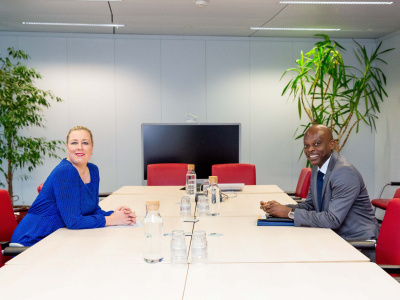
Partnerships with business for development – Volume 5, Issue 2 (March/April 2016)
Download GREAT Insights Editorial
Dr. San Bilal and Karim Karaki - Head and Policy Officer (respectively) of Economic Transformation and Trade Programme, ECDPM
The major conferences in 2015 resulted in a set of ambitious agreements on sustainable development, emphasising the need for the development community - including the private sector - to pull together a set of complementary and mutually reinforcing resources, capabilities and knowledge to address sustainability challenges. Turning to 2016 and the implementation of the 2030 Agenda, inclusive multi-stakeholder partnerships are therefore perceived and promoted as a key instrument for the realisation of the Sustainable Development Goals: partnership platforms are arising; new instruments are being set-up. But if we want to get a better picture of not just what is desirable but what is feasible, the link between policy and practice needs to be brought front and centre.
Facilitating partnerships
Towards a governance of trust: Leading collectively in multi-stakeholder partnerships
Petra Kuenkel, Executive Director, Collective Leadership Institute
For Agenda 2030 to succeed, joint CSO-business partnerships become increasingly important. However, their success hinges on the capacity to lead change collectively. Governance structures need to reflect this.
Promoting inclusive business models
Fulvia Farinelli, UNCTAD
In the face of rising inequalities within and among countries, partnering between businesses, CSOs and institutions as a way to tap into their complementary resources and expertise is critical, including in terms of pro-poor inclusiveness and sustainability.
Corporate-NGO inclusive business partnerships: Why they work and why they don't
Bhaskar Chakravorti, Senior Associate Dean, Tufts University
Corporate-NGO partnerships potentially offer further resources and added-value to their members, allowing them to contribute to their core mission. To realise such potential can however be a bumpy road. The article thus presents five key questions to address in order to achieve effective partnerships.
Partnerships for impact
Waste management driving green growth
Amélie Heuër, Head of Research, SEED, and Moussa Dogo Ali, Director GVD-Afrique/founder Almodo
In the context of the implementation of the Sustainable Development Goals (SDGs), SEED and its winner Almodo illustrate how valuable multi-stakeholder partnerships can contribute to SDG 12 for ensuring sustainable consumption and production patterns.
Innovative partnerships: The COLEACP model
Jeremy Knops and Hilary Barry, Director of Operations and Institutional Partnership & Development Advisor (respectively), COLEACP
Over the past 40 years, COLEACP has acquired extensive experience in supporting a sustainable and inclusive agricultural trade between ACP countries and the EU. Members of the association, ACP and EU businesses, are convinced that innovative partnerships with civil society organisations (CSOs) and donors create the opportunity to promote sustainable agricultural practices while sourcing from competitive small-scale farmers.
Deconstructing partnerships
Karim Karaki, Policy Officer Economic Transformation and Trade Programme, ECDPM
While CSO-business partnerships are being promoted by the development community, understanding how they work in practice has never been more pressing if they are to succeed and contribute to achieving the Sustainable Development Goals (SDGs).
Four tips for effective corporate/NGO partnerships
Ben Packard, Managing Director Corporate Engagement, The Nature Conservancy, and Catherine Gunsbury, Director Sustainability & Transparency, General Mills
Gleaned from a 40-year plus partnership, General Mills and the Nature Conservancy have put together their list of recommendations for successful and sustainable NGO-corporate collaborations.
Partnerships in extractives
Debunking myths on due diligence in mineral trade
Dirk-Jan Koch, Special Envoy Natural Resources, The Netherlands government
A question often raised is about how to involve the private sector to contribute to the 2030 Agenda. The example of the due diligence for companies in the mineral sector shows that managing and dealing with risks can be a business opportunity. As part of it, collaborating with CSOs provides often necessary knowledge and networks.
Community engagement in extractive industries
Emma Wilson, Independent Researcher and Consultant
Getting community engagement right – making sure it is ‘meaningful’ – is critical to the social license to operate for oil, gas and mining projects. Government and industry responsibilities in this respect are equally important.
Diamonds for development
Rory More O'Ferrall, Honorary Vice Chairman, Diamond Development Initiative
This year, the United Nations officially adopted the Sustainable Development Goals. This article describes how governments, civil society and industry are working together to address a complex social and development challenge.
Regulars Talking Points Blog highlights
This publication benefits from structural support by ECDPM’s institutional partners The Netherlands, Belgium, Finland, Ireland, Luxembourg, Portugal, Sweden, Switzerland, Austria and Denmark. This particular issue also benefits from funding from the Department of International Development (DFID), United Kingdom.
Read GREAT Insights volume 5, issue 2: [gview file="http://ecdpm.org/wp-content/uploads/GreatVol5_issue2_Partnerships_with_Business_for_development_webv.pdf" save="1"]




